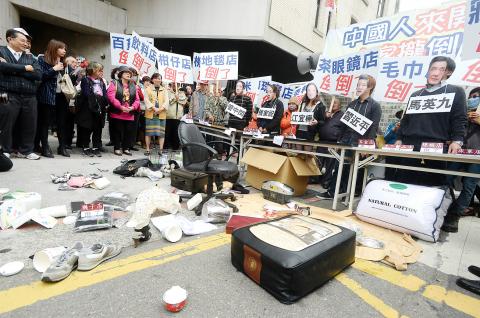|
Renegotiate service
trade pact: groups
RECIPROCITY? The pact will require Taiwan to
open almost all its industries to Chinese investment, but China is not offering
the same back, protesters said
By Chris Wang / Staff reporter

Representatives of civic groups,
the manufacturing and retail industries and the Taiwan Solidarity Union
yesterday protest the proposed cross-strait service trade agreement outside the
Legislative Yuan in Taipei.
Photo: Wang Yi-sung, Taipei Times
Representatives from civic groups, the
manufacturing and retail industries and the Taiwan Solidarity Union (TSU)
yesterday voiced their strong opposition to a proposed cross-strait service
trade agreement on the sidelines of a public hearing at the legislature on the
agreement’s impact on local businesses.
The legislature yesterday held the 12th of 16 public hearings on the service
trade pact’s potential impact on the retail and wholesale sectors mandated by a
legislative resolution.
Representatives from the manufacturing and retail industry staged a protest in
front of the Legislative Yuan building, demanding that the sectors be excluded
from the agreement because the market opening could jeopardize local businesses
and job opportunities.
“We’re talking about the livelihoods of more than 3 million vendors, shops and
small manufacturers, as well as more than 10 million employees in the industry.
It would be difficult for us to compete with state-backed Chinese investors and
businesses,” said Huang Kuang-yi (黃光藝), spokesperson of an alliance of local
retailers and manufacturers.
The Democratic Front Against Cross-Strait Trade in Services Agreement organized
a press conference outside the Legislative Yuan’s conference room, where the
hearing took place, calling for a renegotiation of the agreement and more public
hearings in light of new findings about the agreement.
Information from different government agencies on which sectors will be
liberalized appears to be inconsistent, raising concern over possible flaws in
the bilateral negotiation process, alliance spokesperson Lai Chung-chiang (賴中強)
said.
For example, Taiwan is expected to liberalize commissioner agents’ services and
protect franchising services under the category of distribution services, as
regulated by the UN Provisional Central Product Classification (聯合國中央產品分類暫行版),
according to the specific commitments listed in the agreement, he said.
However, information provided by the Ministry of Economic Affairs states that
Taiwan would protect commissioner agents’ services and liberalize franchising
services, he said.
“With flaws like these, we should renegotiate the agreement,” Lai said.
At a press conference held simultaneously with the hearing, TSU Legislator Hsu
Chung-hsin (許忠信) said that the agreement was not reciprocal, as Taiwan will have
to liberalize almost its entire retail and wholesale sectors to Chinese
investment, but Beijing will not offer the same treatment to Taiwanese investors
and businesses.
“China will only liberalize part of its cross-border services and commercial
presence to Taiwan,” Hsu said.
Reciprocity is crucial for Taiwan’s retail and wholesale sector, which accounted
for 28.6 percent of the nation’s GDP last year, he said.
|
![]()
![]()
![]()